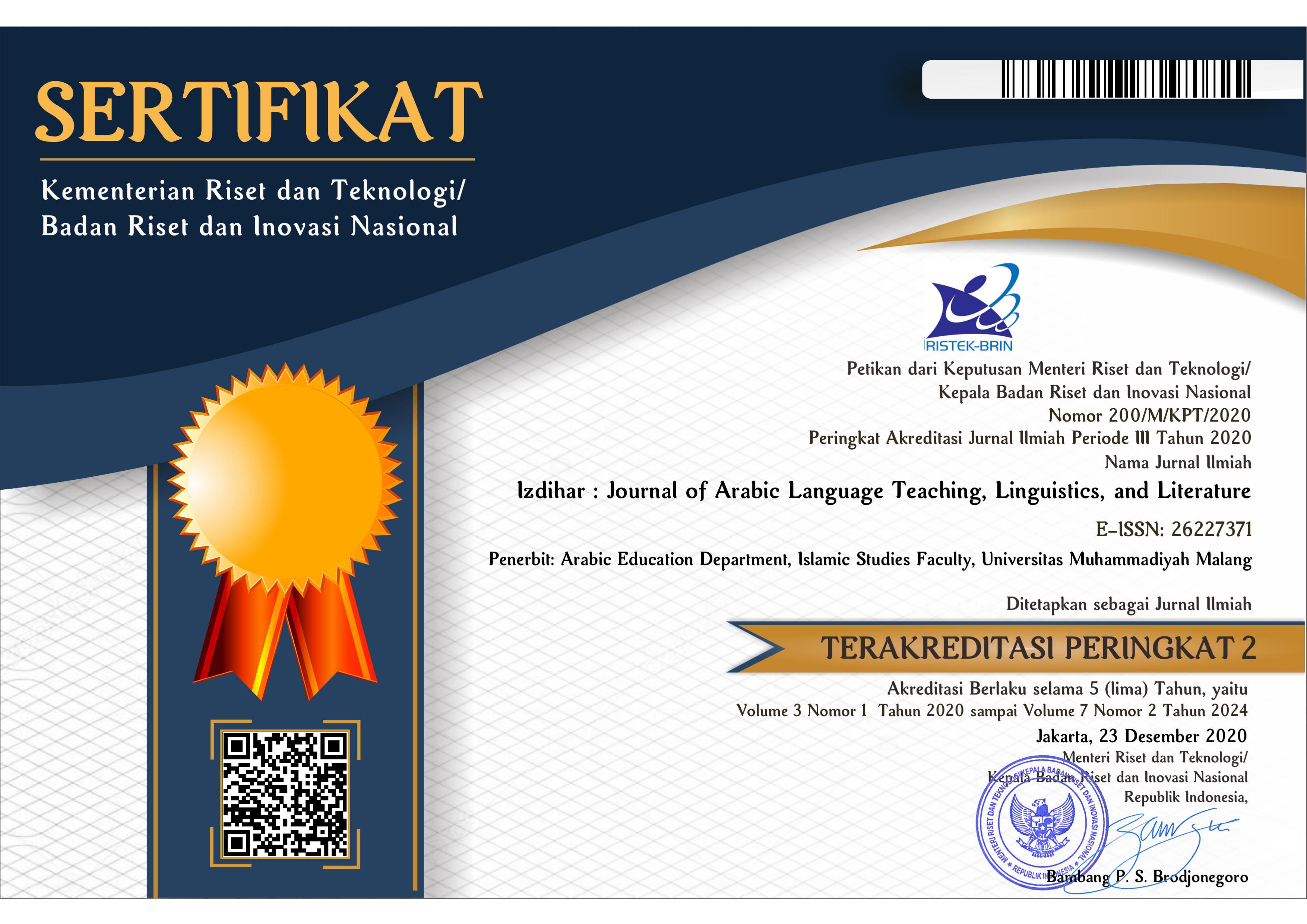Factors Influencing Motivation in Online Arabic Learning of Indonesian Older Man
DOI:
https://doi.org/10.22219/jiz.v4i1.15270Keywords:
Arabic, Older Man, Motivation, Online LearningAbstract
Changes in the offline learning system to online learning have an effect on the demotivation of students to learn. However, this fact does not affect an elderly Indonesian male. This study aims to explore motivational factors for these elderly men in participating in an online Arabic learning program organized by an informal institution in Indonesia. A narrative research design was used in this study. The data was extracted through in-depth interviews. The results showed that there were several factors that influenced the motivation to learn Arabic online from elderly men, namely: Motivation to understand Al-Qur'an, motivation from friends, and presentation of interesting Arabic material. These findings suggest further research on the motivation to learn Arabic online by involving elderly participants of various genders.
Downloads
References
Affouneh, S., Salha, S., & Khlaif, Z. N. (2020). Designing quality e-learning environments for emergency remote teaching in coronavirus crisis. interdisciplinary journal of virtual learning in medical sciences, 11(2), 135–137. https://doi.org/10.30476/ijvlms.2020.86120.1033
Ahmadi, A., & Ilmiani, A. M. (2020). The use of teaching media in Arabic language teaching during covid-19 pandemic. Dinamika Ilmu: Jurnal Pendidikan, 20(2), 307–322. https://doi.org/10.21093/di.v20i2.2515
Al-Maroof, R. S., Salloum, S. A., Hassanien, A. E., & Shaalan, K. (2020). Fear from covid-19 and technology adoption: The impact of google meet during coronavirus pandemic. Interactive Learning Environments, 1–16. https://doi.org/10.1080/10494820.2020.1830121
Atiah, S., Nurmanik, T., & M, M. (2020). Pembelajaran daring melalui penggunaan edmodo dalam meningkatkan keterampilan membaca. Prosiding Seminar Nasional Pendidikan STKIP Kusuma Negara II, 7–11. https://jurnal.stkipkusumanegara.ac.id/index.php/semnara2020/article/view/380
Clandinin, D. J., & Huber, J. (2010). Narrative inquiry in P. Peterson, E. Baker, & B. McGaw (Eds.), International Encyclopedia of Education (Third Edition) (pp. 436–441). Oxford: Elsevier. https://doi.org/10.1016/B978-0-08-044894-7.01387-7
Corbera, E., Anguelovski, I., Honey-Rosés, J., & Ruiz-Mallén, I. (2020). Academia in the time of covid-19: Towards an ethics of care. Planning Theory & Practice, 21(2), 191–199. https://doi.org/10.1080/14649357.2020.1757891
de Burgh-Hirabe, R. (2019). Motivation to learn Japanese as a foreign language in an English speaking country: An exploratory case study in New Zealand. System, 80, 95–106. https://doi.org/10.1016/j.system.2018.11.001
Escobar Fandiño, F. G., & Silva Velandia, A. J. (2020). How an online tutor motivates e-learning English. Heliyon, 6(8), e04630. https://doi.org/10.1016/j.heliyon.2020.e04630
Fryer, L. K. (2019). Getting interested: Developing a sustainable source of motivation to learn a new language at school. System, 86, 102120. https://doi.org/10.1016/j.system.2019.102120
Gibson, K. (2020). Bridging the digital divide: Reflections on using WhatsApp instant messenger interviews in youth research. Qualitative Research in Psychology, 1–21. https://doi.org/10.1080/14780887.2020.1751902
Haniah, H. (2014). Pemanfaatan teknologi informasi dalam mengatasi masalah belajar bahasa Arab. Al-Ta’rib : Jurnal Ilmiah Program Studi Pendidikan Bahasa Arab IAIN Palangka Raya, 2(1). https://doi.org/10.23971/altarib.v2i1.588
Hariani, F., Arbaini, W., & Putri, D. P. (2020). Tingkat pendidikan orang tua: Antar motivasi belajar dan kebiasaan bermain game online. TA’DIBUNA: Jurnal Pendidikan Agama Islam, 3(1), 71–90. https://doi.org/10.30659/jpai.3.1.71-90
Ilmiani, A. M., Marsiah, M., Rahmah, Y., & Mubarak, M. R. (2020). WhatsApp group to optimize the mahārah istimā’ learning during the covid-19 pandemic. ALSINATUNA, 6(1), 16–34. https://doi.org/10.28918/alsinatuna.v6i1.2841
Jiménez, M. Á. F., Rodríguez, E. M., & Vidal, L. I. E. (2017). The tutor’s roles and functions in online education. Qualitative study within the context of worker training. Procedia - Social and Behavioral Sciences, 237, 196–202. https://doi.org/10.1016/j.sbspro.2017.02.063
Kaharuddin, A. (2020). Contributions of technology, culture, and attitude to english learning motivation during covid-19 outbreaks (SSRN Scholarly Paper No. ID 3700381). Rochester, NY: Social Science Research Network. Retrieved from Social Science Research Network website: https://papers.ssrn.com/abstract=3700381
Kung, F.-W. (2019). Teaching second language reading comprehension: The effects of classroom materials and reading strategy use. Innovation in Language Learning and Teaching, 13(1), 93–104. https://doi.org/10.1080/17501229.2017.1364252
Letmiros, L. (2019). Arabic: Why Indonesians have to learn it? International Review of Humanities Studies, 4(2). 610-622. https://doi.org/10.7454/irhs.v4i2.166
Liu, W. C., Wang, J. C. K., & Ryan, R. M. (2015). Building autonomous learners: Perspectives from research and practice using self-determination theory. Springer. Retrieved from https://www.springer.com/gp/book/9789812876294
Martínez Clares, P., Pérez Cusó, J., & Martínez Juárez, M. (2016). Las TICS y el entorno virtual para la tutoría universitaria. Educación XXI: revista de la Facultad de Educación, 19(1), 287–310. https://doi.org/10.5944/educXX1.13942
Mubarak, M. R., Ahmadi, A., & Audina, N. A. (2020). Kombinasi strategi bernyanyi dan bermain: upaya dalam menumbuhkan motivasi mahasiswa tadris biologi (TBG) dalam pembelajaran bahasa Arab. ALSUNIYAT: Jurnal Penelitian Bahasa, Sastra, dan Budaya Arab, 3(1), 15–31. https://doi.org/10.17509/alsuniyat.v3i1.23996
Mubarak, M. R., Wahdah, N., Ilmiani, A. M., & Hamidah, H. (2020a). Penggunaan vlog dalam pembelajaran mahārah kalām. Al Mi’yar: Jurnal Ilmiah Pembelajaran Bahasa Arab dan Kebahasaaraban, 3(1), 109–126. https://doi.org/10.35931/am.v3i1.209
Mubarak, M. R., Wahdah, N., Ilmiani, A. M., & Hamidah, H. (2020b). Zoom cloud meeting: Media alternatif dalam pembelajaran maharah kalam di tengah wabah virus corona (covid-19). Arabiyatuna : Jurnal Bahasa Arab, 4(2), 211–226. https://doi.org/10.29240/jba.v4i2.1445
Murphy, M. P. A. (2020). COVID-19 and emergency eLearning: Consequences of the securitization of higher education for post-pandemic pedagogy. Contemporary Security Policy, 41(3), 492–505. https://doi.org/10.1080/13523260.2020.1761749
Nakata, Y., Nitta, R., & Tsuda, A. (2020). Understanding motivation and classroom modes of regulation in collaborative learning: An exploratory study. Innovation in Language Learning and Teaching, 0(0), 1–15. https://doi.org/10.1080/17501229.2020.1846040
Ollerhead, S. (2019). Teaching across semiotic modes with multilingual learners: Translanguaging in an Australian classroom. Language and Education, 33(2), 106–122. https://doi.org/10.1080/09500782.2018.1516780
Puspitasari, D., Rahayu, W. W., Rohmatunnazilah, & Suwarno. (2020). Exploring the feelings of international students: Journal of International Students, 10(S3), 142–160. https://doi.org/10.32674/jis.v10iS3.3204
Raaper, R., & Brown, C. (2020). The Covid-19 pandemic and the dissolution of the university campus: Implications for student support practice. Journal of Professional Capital and Community, 5(3/4), 343–349. https://doi.org/10.1108/JPCC-06-2020-0032
Rusady, A. T. (2018). Dawaafi'u ath-thullaab fii ta'liimi al-lughoh al-'arabiyah wa daur al-mu'allim fii tarqiyyatihaa. Izdihar : Journal of Arabic Language Teaching, Linguistics, and Literature, 1(1), 65–78. https://doi.org/10.22219/izdihar.v1i1.6563
Schlesselman, L. S. (2020). Perspective from a teaching and learning center during emergency remote teaching. American Journal of Pharmaceutical Education. https://doi.org/10.5688/ajpe8142
Wargadinata, W., Maimunah, I., Febriani, S. R., & Humaira, L. (2020). Mediated Arabic language learning for higher education in covid-19 situation. Izdihar : Journal of Arabic Language Teaching, Linguistics, and Literature, 3(1), 59–78. https://doi.org/10.22219/jiz.v3i1.11862
Widodo, H. P. (2014). Methodological Considerations in interview data transcription. International Journal of Innovation in English Language Teaching and Research, 3(1), 7. https://search.proquest.com/docview/1625463330?pq-origsite=gscholar&fromopenview=true
Xue, E., Li, J., Li, T., & Shang, W. (2020). China’s education response to COVID-19: A perspective of policy analysis. Educational Philosophy and Theory, 1–13. https://doi.org/10.1080/00131857.2020.1793653
Downloads
Published
How to Cite
Issue
Section
License
Copyright (c) 2021 Mahfuz Rizqi Mubarak, Noor Amalina Audina, Nurul Wahdah, Hamidah Hamidah, Aulia Mustika Ilmiani, Izdihar: Journal of Arabic Language Teaching, Linguistics, and Literature

This work is licensed under a Creative Commons Attribution-ShareAlike 4.0 International License.
Copyright Notice
Authors who publish with this journal agree to the following terms:
- Authors retain copyright and grant the journal right of first publication with the work simultaneously licensed under a Creative Commons Attribution-ShareAlike 4.0 International License that allows others to share the work with an acknowledgment of the work's authorship and initial publication in this journal.
- Authors are able to enter into separate, additional contractual arrangements for the non-exclusive distribution of the journal's published version of the work (e.g., post it to an institutional repository or publish it in a book), with an acknowledgment of its initial publication in this journal.
- Authors are permitted and encouraged to post their work online (e.g., in institutional repositories or on their website) prior to and during the submission process, as it can lead to productive exchanges, as well as earlier and greater citation of published work (See The Effect of Open Access).
Copyright (c) 2019 Izdihar : Journal of Arabic Language Teaching, Linguistics, and Literature

This work is licensed under a Creative Commons Attribution-ShareAlike 4.0 International License.

















